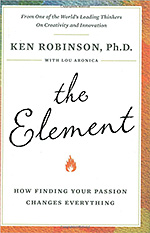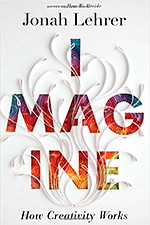I recently read a couple of terrific books on creativity and would like to share them here. These books illustrate that we are all creative but that creativity manifests in a wide variety of ways. But the message is definitely that creativity is not just a talent but a skill which can be learned. And there are lessons here for anyone who is striving to become more creative.
The Element: How Finding Your Passion Changes Everything
 The first book is The Element: How Finding Your Passion Changes Everything by Sir Kenneth Robinson. You may recognize Robinson’s name from a series of TED Talks which he gave on the subject of education and creativity. In his talk, Ken Robinson Says Schools Kill Creativity, and in the book, he makes the argument that the rigidity of our schools not only stifles creativity but it also stifles learning. And, he argues, in a world where creativity is more and more becoming an essential skill we can ill afford to waste creative talent.
The first book is The Element: How Finding Your Passion Changes Everything by Sir Kenneth Robinson. You may recognize Robinson’s name from a series of TED Talks which he gave on the subject of education and creativity. In his talk, Ken Robinson Says Schools Kill Creativity, and in the book, he makes the argument that the rigidity of our schools not only stifles creativity but it also stifles learning. And, he argues, in a world where creativity is more and more becoming an essential skill we can ill afford to waste creative talent.
In the book, Robinson examines different styles of learning and creativity through a series of fascinating profiles of creative people. He argues that each person has a unique set of talents and interests and when we have the opportunity to fully engage them our natural creativity is unleashed. He calls this state of engagement as being in our element and defines it thus: “the Element is the meeting point between natural aptitude and personal passion.”
Some of the people profiled started out in life looking and feeling like misfits in the sclerotic educational institutions in which they found themselves. However, through some combination of luck, initiative, perseverance, and mentoring these highly talented individuals were able to discover their passion. In pursuing their passion, many have created works and performances that are gifts to our culture. The message for the reader is clear: if you are feeling less than passionate about your life you owe it to yourself to uncover whatever it is that captivates you and pursue it.
Imagine: How Creativity Works
 If The Element motivates you to pursue your passion then reading Imagine: How Creativity Works by Jonah Lehrer is a great way to learn how to become more creative. Lehrer, a contributing editor at Wired, was previously a neuroscientist and was also a Rhodes Scholar at Oxford. In this outstanding book he surveys the recent developments in the study of creativity which provide new insights into the way creativity actually does work.
If The Element motivates you to pursue your passion then reading Imagine: How Creativity Works by Jonah Lehrer is a great way to learn how to become more creative. Lehrer, a contributing editor at Wired, was previously a neuroscientist and was also a Rhodes Scholar at Oxford. In this outstanding book he surveys the recent developments in the study of creativity which provide new insights into the way creativity actually does work.
With the use of technologies like functional magnetic resonance imaging researchers can probe deep inside the mind at work. This allows us to study what the brain is doing at the moment that a flash of insight occurs, for example. And, as Lehrer explains, one of the things that has been learned about these moments of inspiration is that they occur not while concentrating hard on solving problems. Instead, they come in more relaxed moments when various parts of the brain are more freely associating with one another and assembling existing thoughts in new and innovative ways. Periodically, these new thoughts form the solutions to difficult problems or insights into new and better ways of doing things. Across the centuries, we’ve had anecdotes, possibly apocryphal, like the ones of Archimedes in the bathtub or Newton under the apple tree which tended to lend support for this kind of theory. Now, science has proof positive.
The book is not intended as a how-to manual but there are numerous principles elucidated here which the reader can put to practical use. So, for example, if you’ve been working for hours on a difficult problem and you’re not making any progress it’s time to get up and go for a walk, take a nap or otherwise lighten your mental load. There’s no guarantee you’ll get a flash of inspiration while daydreaming but it is, in fact, pretty likely you won’t get that flash while continuing to concentrate deeply on the problem. We now know that’s not the way the brain actually works.
The book is filled with fascinating examples like this and fascinating stories of the research that is giving us definitive proof for the first time as to what works and what doesn’t. For example, group brainstorming doesn’t work very well. Wonder why not? Read the book to find out.